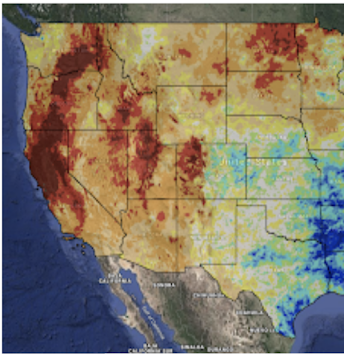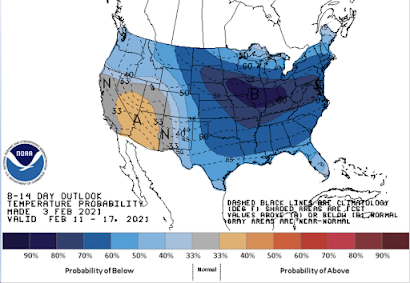Weather: Business, Economists, and the Media's All-Purpose, Lazy Excuse
You've probably noticed a trend in recent headlines.
The above, and many more, represent a coordinated effort by Big Climate to blame weather and global warming for a number of recent recent economic ills.
It would be bad enough if these were merely hyperbole (they are) but they provide cover ("weather is unpredictable," after all) for mismanagement and bad policy.
Let's take an example of the importance of this topic from my home state of Kansas.
Today, The Kansas Reflector, a liberal newspaper published in the state capital of Topeka, quoted an official with Evergy, the state's largest electric utility, as follows:
The cold snap in February from winter storm Uri left Kansas grappling with $1 billion fallout after gas prices spiked by up to 250 times over a few days. Estimates indicate some Kansas customers of Evergy electric company will pay $152.3 million in power costs over two years...
[Evergy's] Grady said one change made to ensure 2021 doesn’t repeat is improved weather forecasting and extreme weather assessments...
Evergy is making the case that it is entitled to this extra money because "improved" weather forecasts are needed -- the obvious implication being February's forecasts were somehow deficient.
But, what if they weren't?
The Forecasts Were Excellent
Evergy might have a case that its customers should pay for conditions the company could not anticipate nor mitigate. But, neither is true.
February 3, the 8-14 day forecast began to show -- 12 days ahead -- predicted colder than average temperatures. The extreme cold began on February 14.
As the calendar moved forward, the forecasts became more dire:
Kansas was in the center of the area where the extreme cold was forecasted.The implication that better weather forecasts were needed to avert the increase in fuel prices is patently false. By using these forecasts, it would have been straightforward for regional utilities to mitigate the extreme increase in (wholesale) spot fuel prices (which went from $2.68 to $329.74[!] during that period) by securing fuel in advance.
Yet the Reflector -- perhaps after seeing the jumble of Associated Press and other groupthink media reports -- evidently doesn't think to investigate and report that the forecasts were fine. Without that, it is unlikely the regulator will protect customers from what might have been incompetence and will just pass along the cost to consumers. Versions of this scenario have already played out in other states.
 |
But it isn't just the Kansas media. With the exception of the extreme summer heat in the Northwest, there wasn't anything particularly unusual about the weather of 2021. Facts:
- Tornadoes were not above average in 2021.
- Northern Hemisphere hurricanes were below average.
- The "unbreakable" drought in the West is breaking (see below).
July 13
 |
| Same color legend as map below. |
December 31
Why Are These Stories Being Written?
The mainstream media has completely bought in to the catastrophic global warming hypothesis -- to the point they have become strong advocates rather than objective reporters.
The MSM is also overwhelmingly liberal. By blaming the weather for our nation's ills, it takes the Biden Administration off the hook for supply chain, inflation and similar economic issues facing us.
Plus, the vast majority of reporters and editors are uncomfortable with science. So, when some 'expert' aligned with their point of view asserts something that is also aligned with their point of view, it gets printed. As in the case of the Kansas Reflector, it gets printed even though it requires being temporarily aligned with the 'evil' electric utility. Most reporters wouldn't even know how to retrieve old forecasts and corresponding actual conditions.
In today's climate, liberal newspapers would rather see their revenue and subscriber base collapse than contradict the "narrative."
Tragically, we have a confluence of events where the media, through both omission and commission, fails to accurately inform their readers, including policy makers that depend on them, of information they critically need to know. If things continue, why do we need the media at all?













Comments
Post a Comment